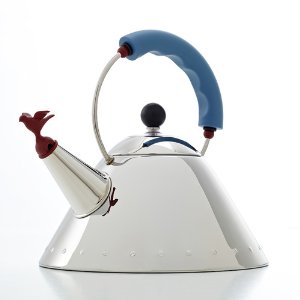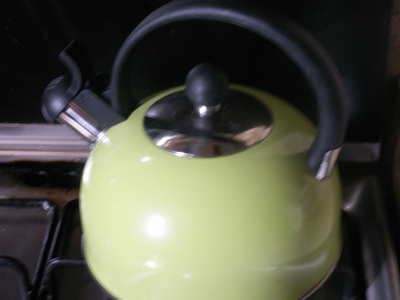For the last three months we have been using a stove top kettle that had no handle or whistle. We do not like to buy things new. But after failing to find a replacement at a car boot sale or the tip we eventually had to give in. A kettle full of hot water and no handle is a dangerous thing but a pan of water just isn’t very easy to pour a cuppa from.
Don’t be daft, of course I didn’t spend that much on a pretty Alessi kettle! Scroll down to see my cheap, green version! 😉
Well after two days of enjoying the ease of use of a whistling kettle with a handle again I got to thinking…
 Getting a new kettle made me think how efficient a stove top kettle with a whistle is. I was going to write a post about how having a whistle made us waste less energy. But then I started researching and it looks like electricity may be the lowest energy way to boil water. But then again it may not. The question is a very complex one and I think you need to think far more broadly than just watts and joules.
Getting a new kettle made me think how efficient a stove top kettle with a whistle is. I was going to write a post about how having a whistle made us waste less energy. But then I started researching and it looks like electricity may be the lowest energy way to boil water. But then again it may not. The question is a very complex one and I think you need to think far more broadly than just watts and joules.
View the Wide Range of Whistling Tea Kettles for Sale
yes they even have the iconic Alessi model pictured, as well as some more economical options!
My gut feeling after reading too much on the subject, is that the whistling stove top kettle is the most efficient way to boil water. My reasoning is this:
- The whistle means you have to return to the kettle to turn it off. This means you don’t forget about the kettle being on for ten minutes and keep reboiling it just to make one cuppa.
- There is less manufacturing involved in producing a stove top kettle. It’s metal and maybe some small bits of basic, easily moulded plastic. In an electric kettle there is much more complicated plastic, cables and electronics.
- They are cheap to make and purchase.
- They tend to last longer than electric kettles as there are less components. I know some people manage to keep electric kettles working for 30 years but in my experience they tend to have a very short lifespan indeed. My mother’s household tends to get a new one every two years (they do drink a lot of coffee).
- If they do get damaged they tend to be more easily ‘fixable’ as there are no electrical bits to worry about.
- The scientific part – how much power does each method use is complicated and very difficult to calculate fully. As each source of power is created in different ways. In general, the electric kettle is more efficient at boiling a set quantity of water. But producing the electricity to power the kettle tends to be less efficient (burning coal, heating water etc) than producing gas energy. If you want to get very technical then see this: how to boil a kettle?.
- There is no element that needs to be covered in water so you can heat as little as you like (many electric kettles need a certain ‘minimum’ volume of water to work).
- If you run a log burner in winter the kettle can be warmed for free there. Even if you cannot get the kettle directly near the burning wood, it will still be able to warm (if not bring to the boil) water considerably. Just place the kettle on a trivet on top of the wood burner, near the pipe which is always very hot. If the water isn’t quite getting to the boil, finish it off on the gas stove.
- Being metal inside they are much easier to descale by simply boiling some water and vinegar in them each month or so. Electric kettles are often plastic inside which is not so tough.
- The stove top whistling kettle is a must for us. Electric kettles are very efficient at boiling water but they still use large bursts of energy which would have a real negative impact on our relatively small solar powered system.
For us, the whistling stove top kettle comes out on top. They are cheap, last a long time, whistle when they’re ready and they can be used on multiple sources of heat. Oh and they can be very green too:

So yes whistling hob kettles are more efficient than electrical ones. But only if you look at the whole picture, not just how many joules you’ll use to boil that cup of water.
For a more self sufficient future…
We use a copper whistling kettle. We figure the copper conducts a tiny bit better than other metals. Never did a comparison test though!
I’m glad to see we’re not the only ones obsessing about kettles at the moment. It’s a bit colder where we are so we have our log burner, (and a stove) burning most of the year. We have no problem boiling our kettles on these and even when they’re dying down at night we use them to gradually warm the kettles for hot-water bottles at bed time. We run off batteries also, and the combination of first of all filling a kettle and bringing in the water pump and then using electricity to boil it can often kickstart our generator unnecessarily, this is annoying as the generator is very wasteful if not used to capacity.
Goo’s last blog post..AC/DC and my inverter
Our stove-top kettle is bright red, but does not whistle. So far that hasn’t been a problem! My kettle makes me smile. Fun post.
Valerie’s last blog post..Seedy Saturday
Sounds like the kettle has it hands down. I agree with you, and I’ll add another reason. We heat with a kerosene stove and have a kettle (with the whistle disabled) on it all the time. It humidifies, keeps the water hot for a cup of tea anytime, and it sounds nice. The sound that a kettle makes as it warms on a fire is referred to as “the wind in the pines” in Japanese. A comforting sound on a cold winter day.
Thanks for great blog.
Dan’s last blog post..Biodynamics and Steiner Education
Glad its not just me then, you lot sure seem to like your kettles too! I see no-one smiling at a plastic electric kettle!
Hey, great post there! Im first time here visited your blog, definitely will visit back later, keep it up
Great read, thanks for putting it up.
Do you know if you can use these kettles on an electric hob or is it just for gas?
Lucy, I believe that most of these that are suitable for electric hobs – there is usually a sticker or something on the box that says which they are okay for.
This is so cool – thank-you for the info! I need a new kettle and I was torn between electric or stove top, and kept having an inner debate over which one was more eco-friendly. It’s nice to know there are other people who are concerned about how our everyday choices impact the environment. I’m going to definitely go with the stove top – considering the resources that go into an electric, plus the plastic…..and I was worried about continually drinking hot water that had been sitting in a plastic container : (
Suzanne, you cannot beat a stove top whistling kettle purely for the lovely sound!